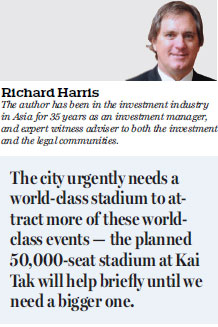Seat in stands for must-see event a pricey proposition
Updated: 2017-04-07 07:04
By Richard Harris(HK Edition)
|
|||||||||
More than a few of you reading this will know that Hong Kong Sevens tickets are extremely hard to get. The demand for Sevens tickets is global, driven by a professional marketing machine sponsored by a global bank and a full-service airline. The Sevens is a "bucket list" event for rugby enthusiasts all over the world, creating huge demand for tickets.
The economics of Sevens tickets has a supply-demand imbalance. It is like "Whack a Mole"; hit one with a mallet and another one pops up - providing headaches for everybody. The supply problem occurs as our largest stadium seats just 40,000 people - about the size of a block in Mong Kok.
It was not always like this. At the first Sevens, 40-plus years ago, loyal rugby supporters like my parents sat in the rain in the old Hong Kong Football Club eating their sandwiches surrounded by empty seats.
Only 3,000 tickets are sold directly to the public at face value. The rest go to sponsors, hospitality packages and rugby clubs. After all the sticky fingers have taken their share, the Hong Kong Rugby Union (HKRU) also needs to make some money to put back into local rugby.

If the supply of tickets is fixed and demand is high, prices must rise. Ticket prices are not sky-high at source because the HKRU rightly wants to avoid rugby-minded people being priced out of the event. So ticket prices have gone up a relatively moderate 80 percent in the past few years but these real price increases have not diminished demand.
The best way to source a ticket is to play for a local club. So club players and social members have mushroomed - pushing up the costs of membership and limiting available tickets.
Readers should be aware that this means of ticket acquisition involves a moment of euphoria (while pulling on that rugby shirt), a period of pain while playing, pleasure afterwards over a small beer, followed by difficulty in doing anything physical for the next five days. Nevertheless, this method has motivated me to extend my playing career again this year to 54 continuous seasons - in order to get my Sevens ticket.
Rugby is genuinely popular at the Hong Kong grassroots as thousands of kids from 5 and up fight out their own competitions. It is character-building for the little players and lets parents get tickets; though the supply has shrunk as demand has exploded.
A safer way of getting the best seats in the house is to be close to a sponsor. These tickets normally come free and without the plebeian burden of overflowing toilets, disgusting food, watery beer and inflated prices. A business box gets you better toilets, a nosebag from a prominent supplier, and the corporate rugby shirt - if the boss' children haven't taken them!
The only other strategy is to hit the free market in which tickets (naturally) sell at premium - well above face value. All but public ballot tickets come with some extra cost - be it sponsorship, club membership, or the sellers' profit that reflects the scarcity value.
There is massive unofficial two-way trade during Sevens week as buyers are matched with sellers by phone, text and email. The HKRU endorses a commercial website, where tickets can trade three times above face value, on which you pay a commission of 13 percent.
In the meantime grassroots economics provides a solution in the form of professional ticket touts who match supply and demand rather like stockbrokers. I have come to regard these gentlemen - many with South London, South Australian or South African accents - kindly. They are necessary economic agents who should be welcomed and encouraged to heighten competition and lower the premium.
Excessive supply and demand imbalances throw up a darker side in the form of fake tickets. This rigs the fair and free market against honest spectators and their protagonists should be tied up and placed into the middle of the pitch during the Samoa versus Tonga game.
The city urgently needs a world-class stadium to attract more of these world-class events - the planned 50,000-seat stadium at Kai Tak will help briefly until we need a bigger one. At least it would be used more often than the Kai Tak cruise terminal - and cost about the same.
However you got your ticket - have a great weekend. And if you get bored - just turn round and watch the rugby!
(HK Edition 04/07/2017 page1)